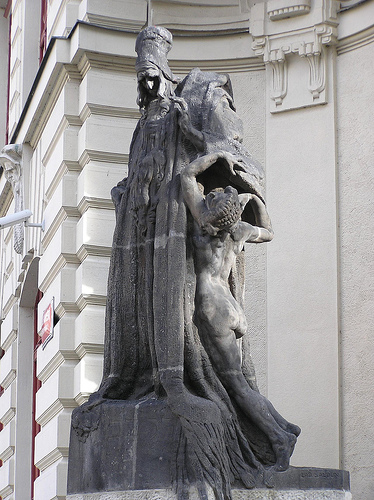In introducing
Dungeons & Dragons to my oldest son, Ezra (age 8), I was amused, bemused and ever so slighted worried by his instant attraction to wanting his character to be a druid. In D&D, druids are kind of lame characters to play so I managed to talk him out of it. An angle on the subject that I didn’t share with Ez is that druidism, in the sense of environmental paganism, far from being extinct, is ascendant at least in our metro area. I also reflected that while Ezra doesn’t know it, he likely has a bit of a druidic genetic heritage himself.
We live in the environs of Seattle, where the citizens chose a new mayor recently but seemed to think they were electing the arch-druid.
Mike McGinn won based on his environmental credentials and as far as I can tell, pretty much nothing else (Sierra Club activist, rides a bicycle around town instead of a car; the photo of him above should be credited to my friend and reader Steve Shay).
As for our family background, when I wrote
my first book, about being adopted and about conversion to Judaism, I researched my birth father to the best of my ability (he resisted) and discovered Welsh roots as the most prominent thread in his genealogy. Wales was the heartland of the druids.
Not much is known about them except from hostile Roman historians. In the
Annals, Tacitus tells about how the Roman governor went after the druidic stronghold on the island of Mona — now Anglesey in North Wales. Bad guys they were, apart from worshipping trees, engaging in human sacrifice which they deemed a useful expedient in predicting the future. I loved this passage about the Roman assault on Mona:
On the shore stood the opposing army with its dense array of armed warriors, while between the ranks dashed women, in black attire like the Furies, with hair dishevelled, waving brands. All around, the Druids, lifting up their hands to heaven, and pouring forth dreadful imprecations, scared our soldiers by the unfamiliar sight, so that, as if their limbs were paralysed, they stood motionless, and exposed to wounds. Then urged by their general’s appeals and mutual encouragements not to quail before a troop of frenzied women, they bore the standards onwards, smote down all resistance, and wrapped the foe in the flames of his own brands. A force was next set over the conquered, and their groves, devoted to inhuman superstitions, were destroyed. They deemed it indeed a duty to cover their altars with the blood of captives and to consult their deities through human entrails.
Actually they sound more interesting in Tacitus than they do in Dungeons & Dragons.


